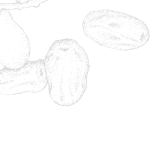Dates are a delicious and nutritious fruit from the date palm, enjoyed in both fresh and dried forms. While they come from the same fruit, their texture, taste, and nutritional profiles differ. This article explores the key differences between fresh dates (like Khalaas or Barhi) and dry dates (like Medjool or Deglet Noor) to help you choose the best option for your diet.
Key Differences Between Fresh and Dry Dates
| Feature | Fresh Dates | Dry Dates |
|---|---|---|
| Texture | Soft, juicy, similar to a grape | Chewy, sticky, denser |
| Taste | Mildly sweet, floral, less intense | Very sweet, caramel-like |
| Moisture | High water content (about 30-40%) | Low water content (about 10-20%) |
| Shelf Life | Short (1-2 weeks in fridge) | Long (months to years when stored properly) |
| Common Varieties | Barhi, Khalaas, Hayani | Medjool, Deglet Noor, Ajwa |
Nutritional Comparison
While both types are rich in fiber, antioxidants, and minerals, drying concentrates the nutrients (and sugar) in dates.
Per 100g Serving:
| Nutrient | Fresh Dates | Dry Dates |
|---|---|---|
| Calories | ~145 kcal | ~280 kcal |
| Sugar | ~32g | ~63g |
| Fiber | ~3.5g | ~8g |
| Potassium | ~650mg | ~700mg |
| Magnesium | ~50mg | ~65mg |
Key Takeaways
- Dry dates have more calories and sugar due to water loss.
- Fresh dates are lower in sugar and have a higher water content, making them slightly more hydrating.
- Both are excellent for digestion, energy, and heart health.
Health Benefits
Fresh Dates Benefits:
✔ Hydrating (good for summer snacks)
✔ Lower glycemic impact (better for blood sugar control in moderation)
✔ Rich in antioxidants (help fight inflammation)
Dry Dates Benefits:
✔ More concentrated nutrients (higher fiber, iron, and potassium)
✔ Longer shelf life (great for storage)
✔ Quick energy boost (ideal for athletes or fasting)
Best Uses in Cooking
Fresh Dates:
- Eaten as a snack (like grapes)
- Added to fruit salads, smoothies, or yogurt
- Used in Middle Eastern dishes (like stuffed dates with cheese)
Dry Dates:
- Used in baking (cakes, energy bars, cookies)
- Blended into date paste (natural sweetener)
- Added to stews, tagines, and oatmeal for sweetness
Which One Should You Choose?
- For weight loss or lower sugar intake: Fresh dates (in moderation).
- For long storage & quick energy: Dry dates.
- For cooking & baking: Dry dates work best.
- For a refreshing snack: Fresh dates are ideal.
Both types offer great health benefits, so including a mix of both can be a smart choice!
If you prefer juicy, mild sweetness, go for fresh dates. If you love intense sweetness and chewy texture, dry dates are the winner.
Would you like recipe ideas for using dates? Let us know! 😊
